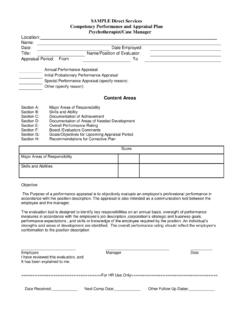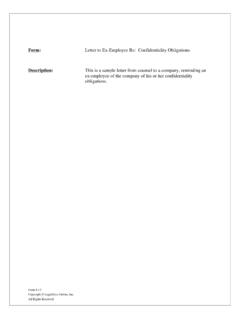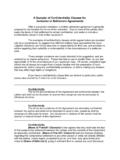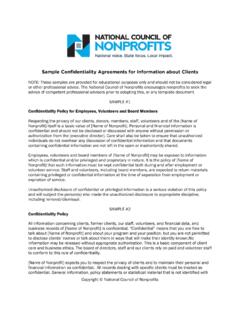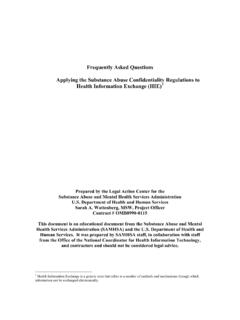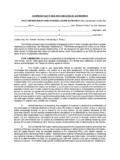Transcription of CONFIDENTIALITY AND HIPAA - Georgia Department of ...
1 Presented to DBHDD Providers By Elizabeth Bentley Watson DBHDD Attorney and HIPAA Privacy Officer August 2014. Disclaimer This presentation does not constitute legal advice. Providers should seek their own legal advice from their own counsel on these subjects. DBHDD Policies and forms are available for your review at DBHDD PolicyStat: You are welcome to copy DBHDD policies, but DBHDD. does not guarantee that they will ensure your compliance with all applicable laws! 2. CONFIDENTIALITY Count$! Federal civil monetary penalties by the Department of Health and Human Services have ranged from: $35,000. To $ Million!! Note that willful neglect in a breach will bring a civil money penalty!! See handout on United States Health and Human Services Resolution Agreements Regarding HIPAA Violations.
2 3. Topics for Presentation Various CONFIDENTIALITY Laws and HIPAA . Eight (8) of the HIPAA procedural bells and whistles . General disclosure practices Risk prevention issues See also: Citations in the slides and on handouts 4. Why CONFIDENTIALITY ? To prevent stigma Negative impacts in employment, relationships, economic status, even possible criminal charges. Trust in treatment relationship Recovery! It's the law Other reasons? 5. CONFIDENTIALITY and HIPAA . Confidential: The property that data or information is private and is not made available or disclosed to persons who are not authorized to access such data or information. HIPAA -speak: Protected Health Information (PHI) . 45 DBHDD Policy 23-100 CONFIDENTIALITY and HIPAA . 6. CONFIDENTIALITY and HIPAA . ALL information about individuals is confidential!
3 ! In every form: Clinical records Letters, court orders Conversations E-mails 45 7. CONFIDENTIALITY and HIPAA . Disclosure The release, transfer, provision of, access to, or divulging in any other manner of information outside the entity holding the information. Disclosure includes: affirmative verification of another person's communication. communication of any information on an identified individual. 45 8. It's not just HIPAA !! . Which law is the least strict on CONFIDENTIALITY ?? 1. Federal Law - CONFIDENTIALITY of Alcohol and Drug Abuse Patient Records 42 Part 2. 2. State laws - CONFIDENTIALITY for mental illness, developmental disabilities and addictive disease. 3. Health Insurance Portability and Accountability Act of 1996 ( HIPAA ). 9. Federal Regulations: Alcohol and Drug Abuse Patient Records Records and information identifying an individual as having an alcohol or drug abuse diagnosis are confidential, and cannot be disclosed without: Written consent of the individual (or a person authorized to give consent).
4 Specific authority in the regulations Records CANNOT be produced in response to a subpoena! 42 Part 2. 10. Federal Regulations: Alcohol and Drug Abuse Patient Records Identifying an Individual : Alcohol and drug information may incriminate! 11. Federal Regulations: Alcohol and Drug Abuse Patient Records What is the name of your facility? Does your facility hold itself out as providing alcohol and drug abuse treatment? What does the fact of admission to or treatment in your facility say about the individual? Your facility may have to follow the strictest CONFIDENTIALITY rules! 12. Federal Regulations: Alcohol and Drug Abuse Patient Records Records which are produced on the individual's authorization must bear notice to the recipient concerning restrictions on further use or disclosure by the recipient.
5 13. Federal Regulations: Alcohol and Drug Abuse Patient Records CONFIDENTIAL AND PRIVILEGED. This information has been disclosed to you from records protected by Federal CONFIDENTIALITY rules (42 Part 2). The Federal rules prohibit you from making any further disclosure of this information unless further disclosure is expressly permitted by the written consent of the person to whom it pertains or as otherwise permitted by 42 Part 2. A general authorization for the release of medical or other information is NOT sufficient for this purpose. The Federal rules restrict any use of the information to criminally investigate or prosecute any alcohol or drug abuse patient. 42 14. Georgia Laws CONFIDENTIALITY of mental health and developmental disabilities information: All information about individuals, whether oral or written and regardless of the form or location in which it is maintained, is confidential and may be disclosed only: When the individual (or another person authorized to do so).
6 Gives written consent, OR. When the law specifically authorizes disclosure. A. 37-3-166 and 37-4-125. DBHDD Policy 23-100, CONFIDENTIALITY and HIPAA . 15. Georgia Laws Disclosures allowed Georgia law authorizes disclosures of mental health and developmental disability records: To physicians or psychologists for continuity of care To clinicians in a bona fide medical emergency To the guardian or health care agent of an individual, or parent or legal custodian of a minor To the individual's attorney, if authorized, AND if requested, at a hearing held under the Mental Health Code For records of a deceased individual, to the administrator/executor or other legal representative of the estate AND in response to a subpoena by the coroner or medical examiner 16. Georgia Laws Disclosures allowed Lawful disclosures, continued: For crimes alleged to occur on program premises, law enforcement may obtain circumstances of the incident For crimes elsewhere, law enforcement may know whether individual was hospitalized, and obtain last known address of individual Upon request and authorization by the individual, notice of discharge of adult involuntary individual may be given to sheriff who transported individual for admission.
7 In response to a valid subpoena or court order of a court of competent jurisdiction, except for privileged information. 17. So what does HIPAA do?? HIPAA adds procedural bells and whistles - 18. HIPAA : Covered Entities Covered entity means: 1) A health plan, 2) A health care clearinghouse, OR. 3) A health care provider who conducts financial and administrative transactions electronically, such as electronic billing and fund transfers. KNOW whether you are a Covered Entity and whether HIPAA and this presentation apply to you! 45 19. 1. Notice of Privacy Practices Notice of Privacy Practices describes Individuals'. RIGHTS, and how your program uses protected health information. 45 DBHDD Policy 23-101 Notice of Privacy Practices . 20. 1. Notice of Privacy Practices Make good faith efforts to obtain a written acknowledgment of receipt of the Notice, even when it is given electronically.
8 Individuals, parents of minor individuals, guardians are ALL. entitled to receive the Notice on request. Notice must be POSTED prominently where it's likely individuals will see it. 45 21. 2. Privacy Official . Health care providers need a designated Privacy Official whose job is to: 1. Implement CONFIDENTIALITY policies and procedures. 2. Receive and handle privacy complaints. 3. Provide information about your Notice of Privacy Practices. 45 (a). 22. 3. Authorization Form . Section on Special CONFIDENTIALITY AUTHORIZATION FOR RELEASE OF. INFORMATION. ____ I authorize the disclosure of alcohol or drug Initials abuse information, if any. _____ I authorize the disclosure of information, if Initials any, concerning testing for HIV and/or treatment for HIV or AIDS and any related conditions.
9 45 ; 42 Part 2. DBHDD Policy 23-100, See Attachment B for the complete form 23. 4. Individual's Rights To access his/her own PHI (clinical records). To request that the provider: Limit the use or disclosure of his/her PHI. Restrict the persons to whom disclosure may be made. Amend PHI in his/her clinical record. To obtain an Accounting of Disclosures of his/her PHI. 45 DBHDD Policy 23-105 Rights of Individuals Regarding Their Confidential and Protected Health Information . 24. 4. Individual's Rights Request restriction of access by others to his/her records. ** New regulation if individual pays in full for services, provider must agree to the restriction. 45 25. 4. Individual's Rights An individual has the right to review of a denial of access if: A licensed health care professional has determined, in the exercise of professional judgment, that the access requested is reasonably likely to endanger the life or physical safety of the individual.
10 This restriction applies only to individuals who are currently being treated by the facility or program from which they are requesting records. 45 (a)(3) AND. Georgia Regulations (3). 26. 5. Complaints Anyone can file a Complaint with a provider about CONFIDENTIALITY rights. The health care provider may not retaliate against an employee who makes a complaint. Designate which staff will receive complaint forms. Individuals may also complain to the United States Department of Health & Human Services. 45 (d); (a). DBHDD Policy 23-103, CONFIDENTIALITY and HIPAA Privacy Complaints and Attachment B, Privacy Complaint Report Form . 27. 6. Business Associates Business Associate: A person or entity who, on behalf of the health care provider, creates, receives, maintains or transmits PHI.





